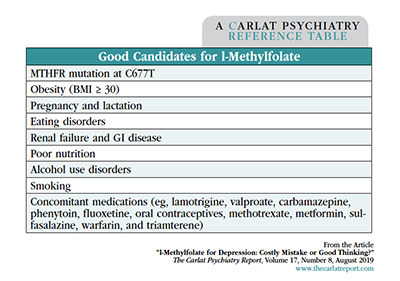l-Methylfolate for Depression: Costly Mistake or Good Thinking?
Folate (Vitamin B9) has a long track record as a low-cost, low-risk augmentation strategy in depression. It’s also available in a more expensive form, l-methylfolate (Deplin), that promises better results but at a premium price. So, is the cost worth it?
Folate pathways
Folate (the natural form of folic acid) is a B vitamin that’s important in psychiatry because it’s involved in the synthetic pathways of several neurotransmitters vital in the treatment of depression. Folate converts to l-methylfolate through an enzyme called MTHFR (methylene tetrahydrofolate reductase). L-methylfolate is the only form of this compound that can cross the blood-brain barrier, but not everyone can make l-methylfolate due to mutations in the MTHFR gene.
MTHFR mutations moderately increase the risk of depression (odds ratio 1.4) (Gilbody S et al, Am J Epidemio 2007;165(1):1–13). In the general population, the prevalence of MTHFR mutations is about 30%–40%, but patients with depression have a higher prevalence—around 60% (Mischoulon D et al, CNS Spectr 2012;17(2):76–86). These mutations are also more common in people of Hispanic or Mediterranean descent.
Evidence in depression
Folic acid and l-methylfolate have been used in controlled trials for antidepressant augmentation with mostly positive results. Among the augmentation studies, the best evidence supports l-methylfolate. It worked in a large controlled study involving 148 patients randomized to either an SSRI plus placebo or an SSRI plus l-methylfolate. The number needed to treat was 6, and the 15 mg/day dose was more effective than the 7.5 mg/day dose (Papakostas GI et al, Am J Psychiatry 2012;169(12):1267–1274). L-methylfolate has not been evaluated as monotherapy for depression in placebo-controlled studies.
Unfortunately, we don’t know whether l-methylfolate is more effective than folic acid since there are no head-to-head trials, though the folic acid studies are less convincing. The largest randomized controlled trial was negative (n = 475), and the two positive trials had problems. One (n = 127) was positive only in women—a finding that has not been reproduced or explained—and the other (n = 27) barely achieved statistical significance (p = 0.04) (Sarris J et al, Am J Psychiatry 2016;173(6):573–587).
Although the short-term trials of folic acid are disappointing, longer-term data from three controlled trials suggest it may be effective in preventing depression when taken for several months or years. However, these trials paired folic acid with vitamins B12 (500 mcg/day) and B6 (25 mg/day) (Almeida OP et al, Int Psychogeriatrics 2015;27(5):727–737).
All forms of folate are well tolerated. However, folic acid supplements are not without risk, since they can mask B12 deficiency, detectable by measuring serum concentrations of vitamin B12 or methylmalonic acid. Supplementation with l-methylfolate avoids this issue.
Who responds best?
Some patients are more likely to respond to l-methylfolate for various reasons, including those with low serum folate levels and difficulty converting folate into l-methylfolate. Predictors of a favorable response are listed in the table on this page. One of them, the MTHFR C677T mutation, is often included on genetic testing panels, but there’s a less expensive biomarker with better clinical evidence as a predictor of l-methylfolate response: obesity. In the original study, patients with a BMI ≥ 30 were significantly more likely to respond to l-methylfolate (Shelton RC et al, J Clin Psychiatry 2015;76(12):1635–1641).
L-methylfolate can work in patients with both low and normal serum folate levels, because blood tests look at peripheral folate levels and not CNS folate, where patients could still have a deficiency (Fava M et al, J Clin Psychiatry 2009;70:12–17).
TABLE: Good Candidates for l-Methylfolate
Practical use
All forms of folate are available OTC, even l-methylfolate, which comes as both OTC and prescription-only products. The prescription form is FDA regulated as a “medical food” (under the brand name Deplin). If a Deplin rep has ever visited your office, then you’ve probably heard the claim that the product is “higher quality” than OTC versions like MethylPro. There’s no evidence to support that, so either form of l-methylfolate is suitable for use.
Insurance rarely covers medical foods, so cost considerations will usually determine the choice. Deplin is $58 per month through a specialized pharmacy on its website (www.deplin.com), while MethylPro is $30 per month (www.methylpro.com).
I would start with l-methylfolate 15 mg/day for all your patients because a significant portion of depressed patients will be resistant to folic acid due to MTHFR mutations or have additional factors, such as obesity, causing low l-methylfolate levels (see Good Candidates for l-Methylfolate table on page 2). Patients often ask about genetic testing for MTHFR mutations, but it’s often cheaper to just try l-methylfolate and see if it works, especially since MTHFR mutations are not the only predictor of response.
You could also start with cheaper folic acid, which costs about $1.50 to $19 per month in the doses used in the studies (0.5 mg to 10 mg/day). However, it’s hard to justify the savings when folic acid isn’t as likely to work. If a patient wants to try folic acid anyway, I’ll suggest starting with l-methylfolate and consider switching to the cheaper agent later. Specifically, I’ll wait until the patient has recovered for 6 months with l-methylfolate and then see whether recovery is maintained after substituting folic acid (3 mg/day).
TCPR Verdict: Consider l-methylfolate for your depressed patients. It’s good thinking because it‘s a safe and effective strategy. Add it at 15 mg/day to an antidepressant for greater response.
To learn about other folate vitamins in psychiatry, listen to our 8/5/19 podcast, “The Choice: Deplin, Folate, or Folic Acid” on your podcast store.
Newsletters
Please see our Terms and Conditions, Privacy Policy, Subscription Agreement, Use of Cookies, and Hardware/Software Requirements to view our website.
© 2025 Carlat Publishing, LLC and Affiliates, All Rights Reserved.



_-The-Breakthrough-Antipsychotic-That-Could-Change-Everything.webp?t=1729528747)



